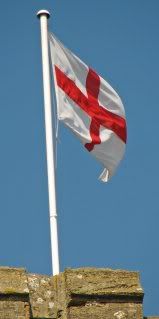 Enjoy St. George's Day, celebrate it even though we do not know much about St. George. We do know that there has been a resurgence and rebirth of our Patron Saint as a cultural entity and identity most probably due to actual and perceived attempts to ignore, sideline or belittle England and the English.
Enjoy St. George's Day, celebrate it even though we do not know much about St. George. We do know that there has been a resurgence and rebirth of our Patron Saint as a cultural entity and identity most probably due to actual and perceived attempts to ignore, sideline or belittle England and the English.So what to do? What to believe about this "not even English" soldier when even more than 1500 years ago details was vague: Pope Gelasius in 496 stated that George was among those saints "whose names are justly reverenced among men, but whose actions are known only to God" (presumably referring to the legend of St. George and the Dragon). Yet he is venerated in many Christian denominations and numerous cities, regions and countries, which is quite extraordinary considering, as previous mentioned, and as Gelasius' quote reveals, next to nothing is known about him for certain. Borrowing heavily from GodzDogz we can examine what he was renowned for: martyrdom, which isn't simply dying for what you believe in...
George, in the face of temptation (offered excessive wealth to renounce his belief) darkness, persecution, extended and brutal torture, chose death rather than do what was not right (he also gave away all his possessions to the poor when he realised what his final fate would be)."Martyrdom is now an ambiguous and misunderstood phenomenon. If it simply means 'dying for what you believe', what makes that laudable and holy? It is certainly not laudable and holy if such a demise inflicts suffering and death on others, or if it is a deliberate taking of one’s own life removed from the context of threat and persecution in faith."
The first known mention of St George in England was by Bede in the 8th Century, and as mentioned in the 9th Century in Alfred the Great's will: "Saint George and his feast day began to gain more widespread fame among all Europeans, however, from the time of the Crusades".
So why is this Roman soldier - of what today would be Turkish and Palestinian descent - defining my country’s soul, why is George patron of England? Not because he defines who England is, but because he exemplifies what we should be: charitable, tolerant, brave, compassionate, honourable, Christian."As a soldier he would have known battle, faced the possibility of death. This is not the issue. His submissive, passionate action, defying soldier’s orders, maintained compassion in the face of tyranny and justice at the risk of dishonour and treason. This is the example that so many have found in our patron saint, that sudden rush of love that falls on those born again in the Spirit, that at the last, changes one’s life."
Sláinte
YanıtlaSil"but because he exemplifies what we should be: charitable, tolerant, brave, compassionate, honourable, Christian."
YanıtlaSilWell I agree with the first five but the sixth one, I'll pass on that. By the way, in the absence of definitive proof that God exists how can insurance companies wriggle out of paying out over "Acts of God."
"To be honest I expected it and nearly didn't write it but though I had better"
YanıtlaSilA writer told me years ago that you should always go with what you feel, providing it doesn't caused legal problems. You can always recant at your leisure although that didn't help Thomas Cranmer much.
hahaha! Yes...and a few more along the way!
YanıtlaSiland as a very late afterthought: I'v ejust noticed I wrote "...of course Christains aren't 'Christian' at all
YanıtlaSilwhich is both disgraceful and wrong generalisation...I meant "MANY Christians aren't..."
And also I didn't remark on your very interetsing "Acts of God" Insurance thing, I wonder has anyone tried such a defence, or whether the small print covers what they really mean.